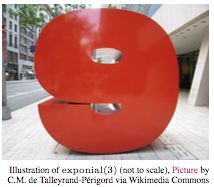- 数字转换(dp+数论)
小崔的技术博客
算法
题意:如果一个数x的约数之和y(不包括他本身)比他本身小,那么x可以变成y,y也可以变成x。例如,4可以变为3,1可以变为7。限定所有数字变换在不超过n的正整数范围内进行,求不断进行数字变换且不出现重复数字的最多变换步数。思路:可以将每个数与能到达的数之间连一条边,这样就会形成一个森林,而题目要求的就是在森林中找一棵树的最大直径。问题转换为求树的最大直径:第一步:用筛法的变形求每个数的约数之和第二
- 基础算法--欧拉函数
不会搬砖的淡水鱼
基础算法算法java数据结构
欧拉函数(Euler’stotientfunction),也称为费马函数,是一个与正整数相关的数论函数,用符号φ(n)表示。欧拉函数φ(n)定义为小于或等于n的正整数中与n互质的数的个数。RSA加密算法(Rivest-Shamir-Adleman)就是通过欧拉函数进行公钥加密。具体而言,对于给定的正整数n,欧拉函数φ(n)计算满足以下条件的k的个数:1≤k≤n,且k与n互质(即k和n的最大公约数为
- CSS语言的数论算法
宇瞳月
包罗万象golang开发语言后端
CSS语言的数论算法引言数论作为数学的一个重要分支,主要研究整数及其性质。数论的基本问题包括素数的性质、最大公约数、最小公倍数、同余等,同时数论在密码学、计算机科学等领域具有广泛的应用。而CSS(层叠样式表)本身是一种样式表语言,用于控制HTML文档的样式和布局,虽然CSS本身并不能直接进行复杂的数论运算,但它可以和JavaScript等编程语言结合使用,实现数论算法的可视化与交互。本文将探讨数论
- 小凯的疑惑(数论 )
vir02
算法数据结构c++
#includeusingnamespacestd;typedeflonglongll;intmain(){//请在此输入您的代码lla,b;cin>>a>>b;llN=a*b-a-b;cout<<N;return0;}如果a和b互素,那么a*b-a-b是最大无法被表示的金额
- 论当今的精神状态...(2025.3.14)
VU-zFaith870
日常随笔模拟退火算法
好无聊好烦喏,字符串、线段树、深搜宽搜、DP还有数论...无语。最近OI那边又有西安多校集训的消息,13天的集训,多少是长点。不去是OI的溃败,去了就是whk的惨退。挺纠结,跟家长聊聊吧,大抵是不同意i,我也不打算去,现在OI是有点紧张,但文化成绩别退啊,很难受...我还是习惯在学校安然自得地静心学习,闲暇时放松身心,焦虑时做些心理工作(去找心理老师不错),迷茫时还有身边的一切。因为我眷恋这里..
- CF576A Vasya and Petya‘s Game 题解
W9095
算法学习笔记c++
CF576AVasyaandPetya’sGame数论思维题。根据唯一分解定理,可以知道,如果一个数的各个质因数的数量确定了,这个数也就确定了。每次询问的中,如果xxx是yyy的倍数,证明xxx中含yyy的所有质因数。我们可以枚举质数,判定xxx能否整除这个质数,就可以判断xxx是否含有这个质因数。但是这还不能完全确定xxx,因为这样只能确定是否有某个质因数,而不能确定质因数的数量。为了确定质因数
- leetcode 2024春招冲刺百题计划——动态规划+数论
云深沐子兮
leetcode算法
不打算充钱第一次用java写,有点不熟悉。。。还是用c+stl爽。没写完,不定期更新。在忙八股,先发出来吧,万一有人需要呢先更数论和动态规划目录动态规划篇数论篇动态规划篇70.爬楼梯一眼斐波那契数列。想更进一步可以找一下矩阵写法。classSolution{publicintclimbStairs(intn){if(n==1)return1;elseif(n==2)return2;intsum=0
- 数论-1智乃的数字
幽影欧门
数论c++牛客
链接:登录—专业IT笔试面试备考平台_牛客网题目描述如果一个奇数满足以下两个条件之一:以555结尾各个数位相加的和是333的倍数则称它是一个"智数"前555个"智数"分别为{3,5,9,15,21}\{3,5,9,15,21\}{3,5,9,15,21}现在智乃想要你给升序排序第kkk个"智数"输入描述:第一行输入一个正整数T(1≤T≤105)T(1\leqT\leq10^5)T(1≤T≤105)
- 素数筛介绍,C++实现
非德77
c++算法开发语言密码学
一、素数在数学的奇妙世界里,素数是一个独特而又基础的概念。素数,也被称为质数,是指在大于1的自然数中,除了1和它自身外,不能被其他自然数整除的数。例如,2、3、5、7、11等都是素数,而4(能被2整除)、6(能被2和3整除)等则不是。素数在数学领域中具有举足轻重的地位,是数论等众多数学分支的核心研究对象。在计算机科学领域,素数也有着广泛的应用,比如在密码学中,RSA加密算法就依赖于大素数的性质来保
- 算法竞赛备赛——【数论】快速幂
Aurora_wmroy
算法竞赛备赛算法c++数据结构蓝桥杯
快速幂计算a的b次方时间复杂度:O(logb)#includeusingnamespacestd;constintN=1e5+9;usingll=longlong;#definemod998244353llksm(lla,llb){llres=1;//a=2b=13--1101while(b){//res=2a=2^2b=6//体现倍增思想if(b&1)res=res*a%mod;//res=2a
- php 常用bc函数
任性不起来了
phpbc函数
bcadd—加法,2个任意精度数字的加法计算bcsub—减法bcmul—乘法bcdiv—除法bcpow—乘方bcmod—取模bcsqrt—求二次方根bccomp—比较两个任意精度的数字,返回一个整数的结果:若两数相等返回0,左数大返回1,否则返回-1bcpowmod—求高精度数字乘方求模,数论里非常常用bcscale—设置所有bc数学函数的默认小数点保留位数—比较两个高精度数字,返回-1,0,1
- 【算法学习之路】4.简单数论(4)
零零时
算法学习之路算法学习c++开发语言数据结构数学高精度
简单数论(4)前言三.高精度1.什么是高精度2.解决办法精度乘除法一.精度乘法1.数据的存储2.步骤3.例题:高精度乘法二.精度除法1.例子2.步骤3.例题:高精度除法前言我会将一些常用的算法以及对应的题单给写完,形成一套完整的算法体系,以及大量的各个难度的题目,目前算法也写了几篇,滑动窗口的题单正在更新,其他的也会陆陆续续的更新,希望大家点赞收藏我会尽快更新的!!!三.高精度1.什么是高精度对运
- 欧拉定理
GocNeverGiveUp
数论基础
今天上午近代史和英语又看了看数论,看到了这个费马-欧拉定理,之前还真没见过,只是知道欧拉函数打表欧拉函数φ欧拉定理是用来阐述素数模下,指数同余的性质。欧拉定理:对于正整数N,代表小于等于N的与N互质的数的个数,记作φ(N)例如φ(8)=4,因为与8互质且小于等于8的正整数有4个,它们是:1,3,5,7欧拉定理还有几个引理,具体如下:①:如果n为某一个素数p,则φ(p)=p-1;①很好证明:因为素数
- 【数论 二分查找】P7588 双重素数(2021 CoE-II A)|普及
闻缺陷则喜何志丹
#洛谷普及算法c++洛谷数学二分查找数论位和
本文涉及的基础知识点C++二分查找数论:质数、最大公约数、菲蜀定理双重素数(2021CoE-IIA)题目描述素数(质数)是指在大于111的自然数中,除了111和它本身以外不再有其他因数的自然数。定义双重素数为这样的素数:它的各位数字之和也是一个素数。给定一个闭区间,试确定在该区间内双重素数的个数。输入格式输入包含多组测试数据。输入第一行包含一个整数TTT,表示测试数据的组数。接下来每行一组测试数据
- 【算法】初等数论
非 白
算法开发语言java
初等数论模取余,遵循尽可能让商向0靠近的原则,结果的正负和左操作数相同取模,遵循尽可能让商向负无穷靠近的原则,结果的正负和右操作数相同7/(-3)=-2.3,产生了两个商-2和-3,取余语言中取-2,导致余数为1;取模语言中取-3,导致余数为-2java中%是取余幂1、暴力幂思想:直接将a连续乘以b遍时间复杂度:O(n)空间复杂度:O(1)//求a^bpubliclongpow(inta,intb
- python | math --- 数学函数
黄佳俊、
Pythonpython
这些函数不适用于复数;如果你需要计算复数,请使用cmath模块中的同名函数。常用数论与表示函数math.ceil(x)返回x的上限,即大于或者等于x的最小整数。如果x不是一个浮点数,则委托x.__ceil__(),返回一个Integral类的值。math.fabs(x)返回x的绝对值。math.factorial(x)以一个整数返回x的阶乘。如果x不是整数或为负数时则将引发ValueError。3
- poj 1142 Smith Numbers(数论:欧拉函数变形)
殷华
数学/数论
给定一个数n找出大于n的最小smith数smith数定义如下:一个数n为smith数当且仅当它的所有质因子各位数之和等于n的所有位数之和且n不是素数那么给定一个n,我们就可以每次+1判断是否为smith数这道题唯一的难点就在于找到一个数的所有素数因子套用欧拉函数变形即可375ms代码如下:#include#include#defineLLlonglongLLn;intget_ans(LLn){in
- 探索约数:试除法,约数之和,最大公约数
Lostgreen
数据结构&算法算法最大公约数
引言约数(Divisor)是数论中的基本概念之一,指能够整除某个数的整数。约数在数学、计算机科学和密码学中有着广泛的应用。本文将详细介绍约数的相关知识,包括试除法求约数、最大公约数算法(如辗转相除法和更相减损术),并阐明这些算法的原理和步骤。1.试除法求约数1.1算法原理试除法是一种简单直观的求约数的方法。对于一个数nnn,如果ddd是nnn的约数,则nnn能被ddd整除。通过遍历1到n\sqrt
- ACM培训4
ZIZIZIZIZ()
算法笔记
学习总结--基础数论大多为模板一、GCD(最大公约数)①辗转相除法longlonggcd(longa,longb){longlongr;while(b!=0){r=a%b;a=b;b=r;}returna;}②扩展欧几里得算法intexgcd(inta,intb,int&x,int&y){if(b==0){x=1;y=0;returnaa;}intans=exgcd(b,a%b,x,y);intk
- 【数论】—— 素数
Tom_wsc
数论算法
素数定义因数只有111和这个数本身的数被称作素数。注意:111既不是素数也不是合数,222是最小的素数。两个关于素数的定理唯一分解定理对于任意大于111的整数xxx,都可以分解成若干个素数的乘积:x=p1a1×p2a2×p3a3×⋯×pnan(ai∈Z+)x=p_1^{a_1}\timesp_2^{a_2}\timesp_3^{a_3}\times\cdots\timesp_n^{a_n}(a_i
- 【运行别超时】最近小何去在我们学校的比赛中遇到一个有意思的题,答案做出来了,但运行总是超时。这怎么解决呢?来看看吧。
小浩~
c语言
题目内容如下:小C最近在研究数论,他发现质数有太多美妙的性质了,于是他想要统计一下一段区域里的数有多少是质数,请你编程帮他解决这个问题吧。输入格式:第一行一个正整数t,表示数据组数。(1≤t≤105)接下来t行,每行两个正整数l,r,表示区间的左右端点。(1≤l≤r≤106)输出格式:每组数据输出一个整数,表示闭区间[l,r]中的质数数量输入样例:21326输出样例:在这里给出相应的输出。例如:2
- 2025年日祭
JeremyHe1209
笔记
本文将同步发表于洛谷(暂无法访问)、CSDN与Github个人博客(暂未发布)本蒟自2025.2.8开始半停课。任务计划(站外题与专题)数了一下,通过人数比较高的题,也就是我准备补的题,刚好差不多100道题。于是……摆烂百题计划开始!(糖丸了)(2025.2.8)NetworkNetworkofSchoolsDP优化——矩阵数论——容斥、二项式反演DP优化——斜率优化数据结构——左偏树数据结构——
- 解析数论基础:第三十三章 零点分布(二)
AI天才研究院
计算AI大模型企业级应用开发实战DeepSeekR1&大数据AI人工智能大模型计算科学神经计算深度学习神经网络大数据人工智能大型语言模型AIAGILLMJavaPython架构设计AgentRPA
解析数论基础:第三十三章零点分布(二)作者:禅与计算机程序设计艺术/ZenandtheArtofComputerProgramming关键词:解析数论、黎曼ζ函数、零点分布、素数定理、蒙哥马利猜想、配对相关函数、随机矩阵理论1.背景介绍1.1问题的由来解析数论是现代数学的重要分支,它利用复变函数论等分析学的方法研究数论问题。其中一个核心课题就是研究黎曼ζ函数的性质,特别是它的零点分布。这个问题不仅
- 【密码学基础】RSA加密算法
Mr.zwX
隐私计算及密码学基础密码学安全
1RSA介绍RSA是一种非对称加密算法,即加密和解密时用到的密钥不同。加密密钥是公钥,可以公开;解密密钥是私钥,必须保密保存。基于一个简单的数论事实:两个大质数相乘很容易,但想要对其乘积进行因式分解却极其困难,因此可以将乘积公开作为加密密钥,即公钥;而两个大质数组合成私钥。2密钥对的生成step1生成N(公钥和私钥的一部分)首先选取两个互为质数的数ppp和qqq(p≠q,gcd(p,q)=1p\n
- 数论问题79一一研究成果
李扩继
数据分析深度学习学习方法算法数学建模
(豆包智能搜索一一李扩继)李扩继是一位在数学研究尤其是哥德巴赫猜想研究领域有一定成果的中学老师,以下是关于他的具体介绍:①研究经历:2006年承担咸阳市教研室的立项课题《角谷猜想的研究》,虽未完成角谷猜想的证明,但在意外灵感下开始对哥德巴赫猜想展开持续性研究工作。②发表论文:研究哥德巴赫猜想发表了多篇文章,如2008年的《哥德巴赫猜想的证明》、2010年的《哥德巴赫猜想的“1+1”证明》、2017
- 【算法学习之路】4.简单数论(2)
零零时
算法学习之路算法学习数据结构笔记经验分享
简单数论(2)前言二.快速幂1.什么是快速幂2.前置知识2.1进制转化2.2短除法2.3普通转换法3.快速幂3.1原理3.2代码4.拓展4.1模运算法则4.2题目前言我会将一些常用的算法以及对应的题单给写完,形成一套完整的算法体系,以及大量的各个难度的题目,目前算法也写了几篇,滑动窗口的题单正在更新,其他的也会陆陆续续的更新,希望大家点赞收藏我会尽快更新的!!!二.快速幂1.什么是快速幂快速幂是一
- 数论问题77一一3x+1问题
李扩继
深度学习学习方法算法数学建模数据分析
3X+1问题,也被称为考拉兹猜想、角谷猜想等,是数学领域一个著名的未解决问题,以下是关于它的介绍:问题表述对于任意一个正整数X,如果X是奇数,则将其变为3X+1;如果X是偶数,则将其变为X/2。不断重复这个过程,最终是否无论初始值X是多少,都会经过有限次变换后最终得到1。例如,取X=5,它是奇数,进行3X+1操作得到3×5+1=16;16是偶数,进行X/2操作得到16÷2=8,接着8÷2=4,4÷
- 数论问题76一一容斥原理
李扩继
深度学习数学建模大数据学习方法算法
容斥原理是一种计数方法,用于计算多个集合的并集中元素的个数,以避免重复计算。以下是其基本内容及相关公式:两个集合的容斥原理若有集合A和集合B,那么A与B的并集中元素的个数等于A集合元素个数加上B集合元素个数,再减去A与B交集的元素个数,即|AUB|=|A|+|B|-|A∧B|。例如,一个班级中喜欢数学的有30人,喜欢语文的有25人,既喜欢数学又喜欢语文的有10人。那么喜欢数学或语文的人数为30+2
- 【数论】Acwing质数与约数
九年义务漏网鲨鱼
算法python算法数论质数约数
质数质数的判定(试除法)除了开方的数,其他因数都是成对出现的defis_prime(x):if(x<2)returnFalseforiinrange(2,int(x/i)+1):if(x%iW==0):returnFalsereturnTrue分解质因数defdivide(x):foriinrange(2,int(x/i)+1):if(x%i==0):s=0while(x%i==0):x//=is
- 数论(三)——约数(约数个数,约数和,公约数)
DearLife丶
#数学知识算法gcd约数欧几里德算法
目录试除法求约数求约数个数约数之和欧几里得算法试除法求约数试除法求一个数的所有约数,思路与判断质数的思路一样,优化的方法也是一样的,这里就不再赘述,没有看过我之前关于质数的博客可以点这里。从小到大枚举所有约数,但是我们只需要枚举每一对儿中较小的一个就可以了。时间复杂度:O(sqrt(n))vectorget_divisors(intn){vectorres;//vector数组存储一个数的所有约数
- SQL的各种连接查询
xieke90
UNION ALLUNION外连接内连接JOIN
一、内连接
概念:内连接就是使用比较运算符根据每个表共有的列的值匹配两个表中的行。
内连接(join 或者inner join )
SQL语法:
select * fron
- java编程思想--复用类
百合不是茶
java继承代理组合final类
复用类看着标题都不知道是什么,再加上java编程思想翻译的比价难懂,所以知道现在才看这本软件界的奇书
一:组合语法:就是将对象的引用放到新类中即可
代码:
package com.wj.reuse;
/**
*
* @author Administrator 组
- [开源与生态系统]国产CPU的生态系统
comsci
cpu
计算机要从娃娃抓起...而孩子最喜欢玩游戏....
要让国产CPU在国内市场形成自己的生态系统和产业链,国家和企业就不能够忘记游戏这个非常关键的环节....
投入一些资金和资源,人力和政策,让游
- JVM内存区域划分Eden Space、Survivor Space、Tenured Gen,Perm Gen解释
商人shang
jvm内存
jvm区域总体分两类,heap区和非heap区。heap区又分:Eden Space(伊甸园)、Survivor Space(幸存者区)、Tenured Gen(老年代-养老区)。 非heap区又分:Code Cache(代码缓存区)、Perm Gen(永久代)、Jvm Stack(java虚拟机栈)、Local Method Statck(本地方法栈)。
HotSpot虚拟机GC算法采用分代收
- 页面上调用 QQ
oloz
qq
<A href="tencent://message/?uin=707321921&Site=有事Q我&Menu=yes">
<img style="border:0px;" src=http://wpa.qq.com/pa?p=1:707321921:1></a>
- 一些问题
文强chu
问题
1.eclipse 导出 doc 出现“The Javadoc command does not exist.” javadoc command 选择 jdk/bin/javadoc.exe 2.tomcate 配置 web 项目 .....
SQL:3.mysql * 必须得放前面 否则 select&nbs
- 生活没有安全感
小桔子
生活孤独安全感
圈子好小,身边朋友没几个,交心的更是少之又少。在深圳,除了男朋友,没几个亲密的人。不知不觉男朋友成了唯一的依靠,毫不夸张的说,业余生活的全部。现在感情好,也很幸福的。但是说不准难免人心会变嘛,不发生什么大家都乐融融,发生什么很难处理。我想说如果不幸被分手(无论原因如何),生活难免变化很大,在深圳,我没交心的朋友。明
- php 基础语法
aichenglong
php 基本语法
1 .1 php变量必须以$开头
<?php
$a=” b”;
echo
?>
1 .2 php基本数据库类型 Integer float/double Boolean string
1 .3 复合数据类型 数组array和对象 object
1 .4 特殊数据类型 null 资源类型(resource) $co
- mybatis tools 配置详解
AILIKES
mybatis
MyBatis Generator中文文档
MyBatis Generator中文文档地址:
http://generator.sturgeon.mopaas.com/
该中文文档由于尽可能和原文内容一致,所以有些地方如果不熟悉,看中文版的文档的也会有一定的障碍,所以本章根据该中文文档以及实际应用,使用通俗的语言来讲解详细的配置。
本文使用Markdown进行编辑,但是博客显示效
- 继承与多态的探讨
百合不是茶
JAVA面向对象 继承 对象
继承 extends 多态
继承是面向对象最经常使用的特征之一:继承语法是通过继承发、基类的域和方法 //继承就是从现有的类中生成一个新的类,这个新类拥有现有类的所有extends是使用继承的关键字:
在A类中定义属性和方法;
class A{
//定义属性
int age;
//定义方法
public void go
- JS的undefined与null的实例
bijian1013
JavaScriptJavaScript
<form name="theform" id="theform">
</form>
<script language="javascript">
var a
alert(typeof(b)); //这里提示undefined
if(theform.datas
- TDD实践(一)
bijian1013
java敏捷TDD
一.TDD概述
TDD:测试驱动开发,它的基本思想就是在开发功能代码之前,先编写测试代码。也就是说在明确要开发某个功能后,首先思考如何对这个功能进行测试,并完成测试代码的编写,然后编写相关的代码满足这些测试用例。然后循环进行添加其他功能,直到完全部功能的开发。
- [Maven学习笔记十]Maven Profile与资源文件过滤器
bit1129
maven
什么是Maven Profile
Maven Profile的含义是针对编译打包环境和编译打包目的配置定制,可以在不同的环境上选择相应的配置,例如DB信息,可以根据是为开发环境编译打包,还是为生产环境编译打包,动态的选择正确的DB配置信息
Profile的激活机制
1.Profile可以手工激活,比如在Intellij Idea的Maven Project视图中可以选择一个P
- 【Hive八】Hive用户自定义生成表函数(UDTF)
bit1129
hive
1. 什么是UDTF
UDTF,是User Defined Table-Generating Functions,一眼看上去,貌似是用户自定义生成表函数,这个生成表不应该理解为生成了一个HQL Table, 貌似更应该理解为生成了类似关系表的二维行数据集
2. 如何实现UDTF
继承org.apache.hadoop.hive.ql.udf.generic
- tfs restful api 加auth 2.0认计
ronin47
目前思考如何给tfs的ngx-tfs api增加安全性。有如下两点:
一是基于客户端的ip设置。这个比较容易实现。
二是基于OAuth2.0认证,这个需要lua,实现起来相对于一来说,有些难度。
现在重点介绍第二种方法实现思路。
前言:我们使用Nginx的Lua中间件建立了OAuth2认证和授权层。如果你也有此打算,阅读下面的文档,实现自动化并获得收益。SeatGe
- jdk环境变量配置
byalias
javajdk
进行java开发,首先要安装jdk,安装了jdk后还要进行环境变量配置:
1、下载jdk(http://java.sun.com/javase/downloads/index.jsp),我下载的版本是:jdk-7u79-windows-x64.exe
2、安装jdk-7u79-windows-x64.exe
3、配置环境变量:右击"计算机"-->&quo
- 《代码大全》表驱动法-Table Driven Approach-2
bylijinnan
java
package com.ljn.base;
import java.io.BufferedReader;
import java.io.FileInputStream;
import java.io.InputStreamReader;
import java.util.ArrayList;
import java.util.Collections;
import java.uti
- SQL 数值四舍五入 小数点后保留2位
chicony
四舍五入
1.round() 函数是四舍五入用,第一个参数是我们要被操作的数据,第二个参数是设置我们四舍五入之后小数点后显示几位。
2.numeric 函数的2个参数,第一个表示数据长度,第二个参数表示小数点后位数。
例如:
select cast(round(12.5,2) as numeric(5,2))
- c++运算符重载
CrazyMizzz
C++
一、加+,减-,乘*,除/ 的运算符重载
Rational operator*(const Rational &x) const{
return Rational(x.a * this->a);
}
在这里只写乘法的,加减除的写法类似
二、<<输出,>>输入的运算符重载
&nb
- hive DDL语法汇总
daizj
hive修改列DDL修改表
hive DDL语法汇总
1、对表重命名
hive> ALTER TABLE table_name RENAME TO new_table_name;
2、修改表备注
hive> ALTER TABLE table_name SET TBLPROPERTIES ('comment' = new_comm
- jbox使用说明
dcj3sjt126com
Web
参考网址:http://www.kudystudio.com/jbox/jbox-demo.html jBox v2.3 beta [
点击下载]
技术交流QQGroup:172543951 100521167
[2011-11-11] jBox v2.3 正式版
- [调整&修复] IE6下有iframe或页面有active、applet控件
- UISegmentedControl 开发笔记
dcj3sjt126com
// typedef NS_ENUM(NSInteger, UISegmentedControlStyle) {
// UISegmentedControlStylePlain, // large plain
&
- Slick生成表映射文件
ekian
scala
Scala添加SLICK进行数据库操作,需在sbt文件上添加slick-codegen包
"com.typesafe.slick" %% "slick-codegen" % slickVersion
因为我是连接SQL Server数据库,还需添加slick-extensions,jtds包
"com.typesa
- ES-TEST
gengzg
test
package com.MarkNum;
import java.io.IOException;
import java.util.Date;
import java.util.HashMap;
import java.util.Map;
import javax.servlet.ServletException;
import javax.servlet.annotation
- 为何外键不再推荐使用
hugh.wang
mysqlDB
表的关联,是一种逻辑关系,并不需要进行物理上的“硬关联”,而且你所期望的关联,其实只是其数据上存在一定的联系而已,而这种联系实际上是在设计之初就定义好的固有逻辑。
在业务代码中实现的时候,只要按照设计之初的这种固有关联逻辑来处理数据即可,并不需要在数据库层面进行“硬关联”,因为在数据库层面通过使用外键的方式进行“硬关联”,会带来很多额外的资源消耗来进行一致性和完整性校验,即使很多时候我们并不
- 领域驱动设计
julyflame
VODAO设计模式DTOpo
概念:
VO(View Object):视图对象,用于展示层,它的作用是把某个指定页面(或组件)的所有数据封装起来。
DTO(Data Transfer Object):数据传输对象,这个概念来源于J2EE的设计模式,原来的目的是为了EJB的分布式应用提供粗粒度的数据实体,以减少分布式调用的次数,从而提高分布式调用的性能和降低网络负载,但在这里,我泛指用于展示层与服务层之间的数据传输对
- 单例设计模式
hm4123660
javaSingleton单例设计模式懒汉式饿汉式
单例模式是一种常用的软件设计模式。在它的核心结构中只包含一个被称为单例类的特殊类。通过单例模式可以保证系统中一个类只有一个实例而且该实例易于外界访问,从而方便对实例个数的控制并节约系统源。如果希望在系统中某个类的对象只能存在一个,单例模式是最好的解决方案。
&nb
- logback
zhb8015
loglogback
一、logback的介绍
Logback是由log4j创始人设计的又一个开源日志组件。logback当前分成三个模块:logback-core,logback- classic和logback-access。logback-core是其它两个模块的基础模块。logback-classic是log4j的一个 改良版本。此外logback-class
- 整合Kafka到Spark Streaming——代码示例和挑战
Stark_Summer
sparkstormzookeeperPARALLELISMprocessing
作者Michael G. Noll是瑞士的一位工程师和研究员,效力于Verisign,是Verisign实验室的大规模数据分析基础设施(基础Hadoop)的技术主管。本文,Michael详细的演示了如何将Kafka整合到Spark Streaming中。 期间, Michael还提到了将Kafka整合到 Spark Streaming中的一些现状,非常值得阅读,虽然有一些信息在Spark 1.2版
- spring-master-slave-commondao
王新春
DAOspringdataSourceslavemaster
互联网的web项目,都有个特点:请求的并发量高,其中请求最耗时的db操作,又是系统优化的重中之重。
为此,往往搭建 db的 一主多从库的 数据库架构。作为web的DAO层,要保证针对主库进行写操作,对多个从库进行读操作。当然在一些请求中,为了避免主从复制的延迟导致的数据不一致性,部分的读操作也要到主库上。(这种需求一般通过业务垂直分开,比如下单业务的代码所部署的机器,读去应该也要从主库读取数
![]()


